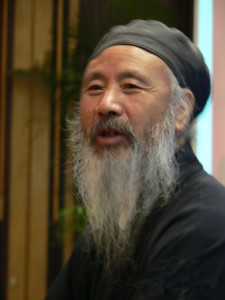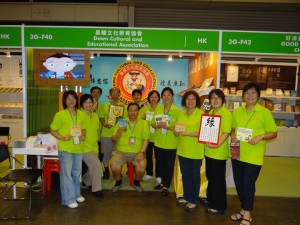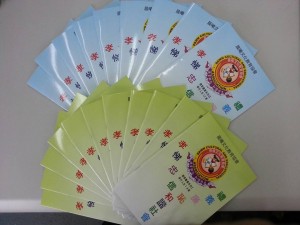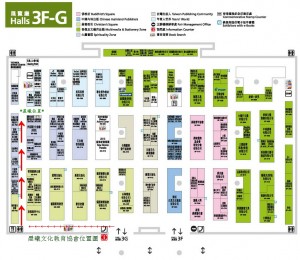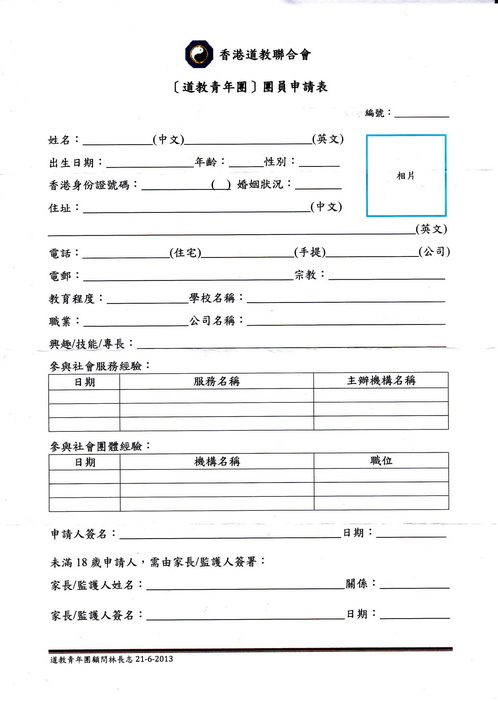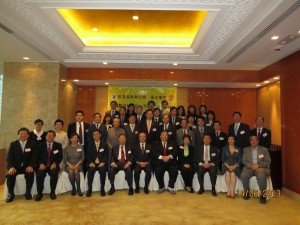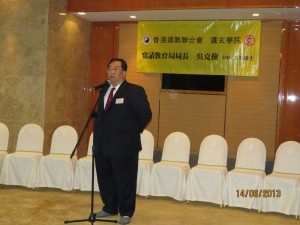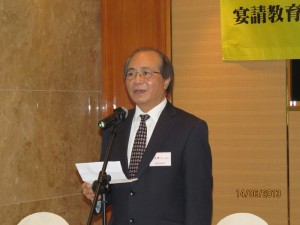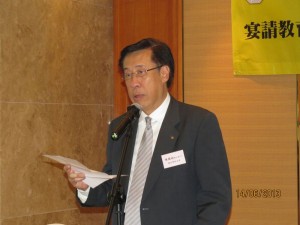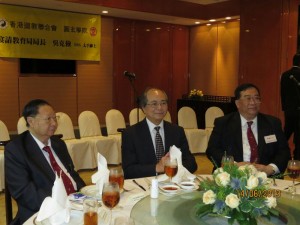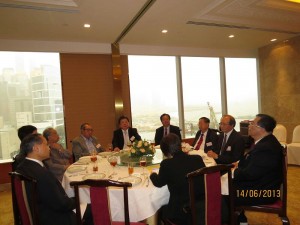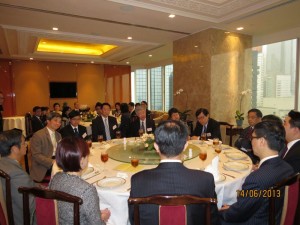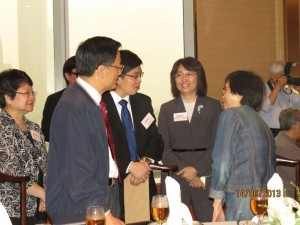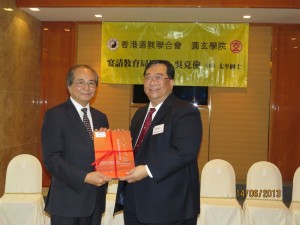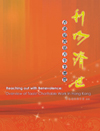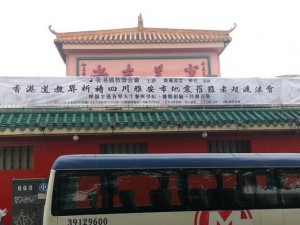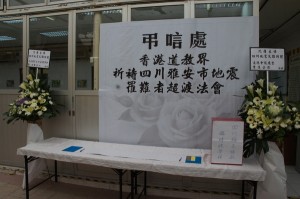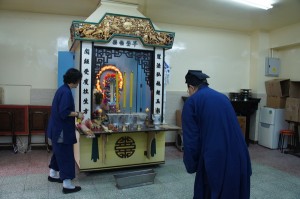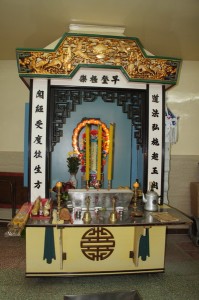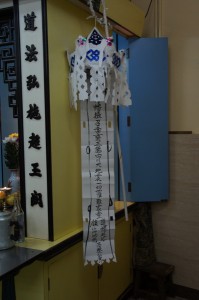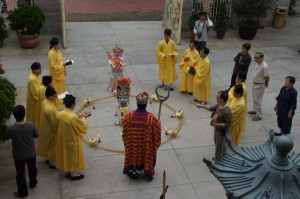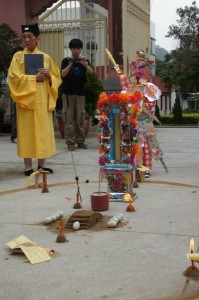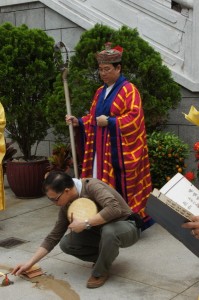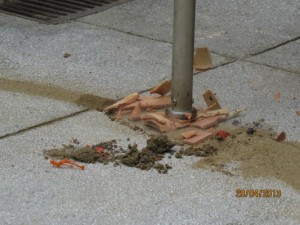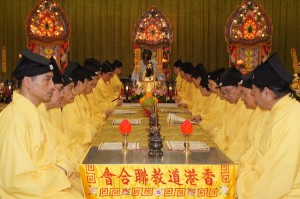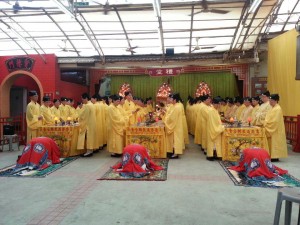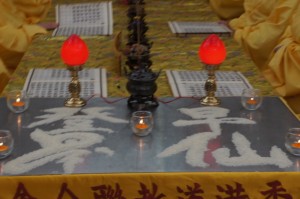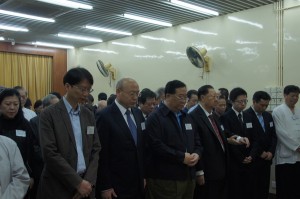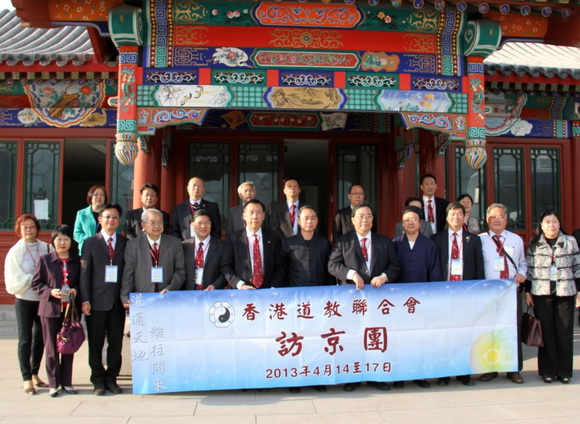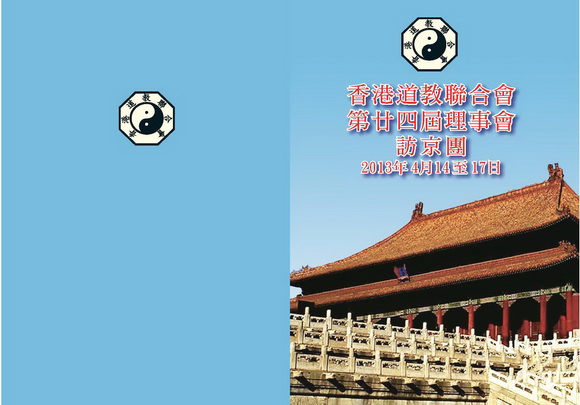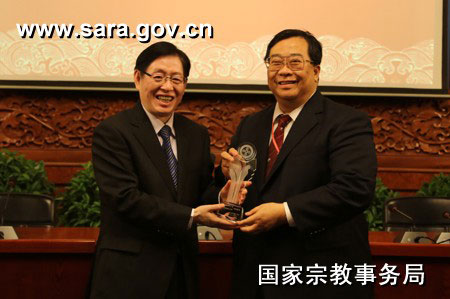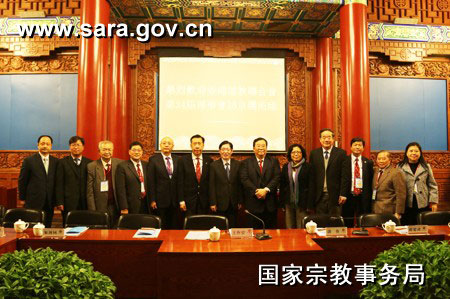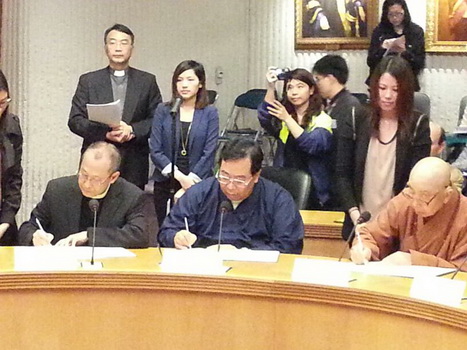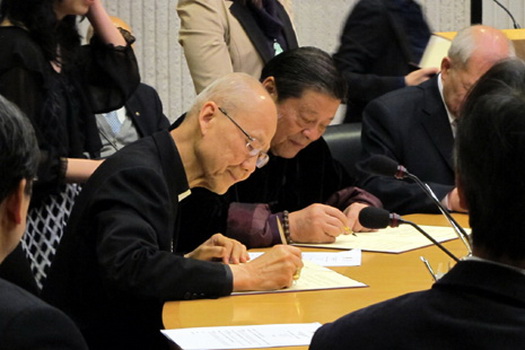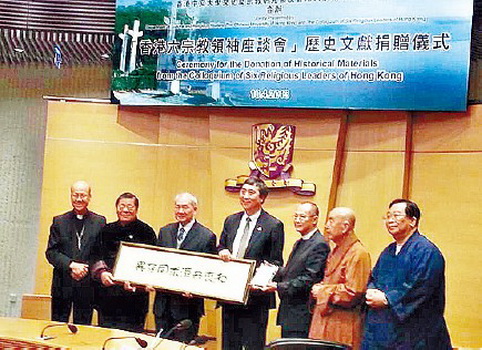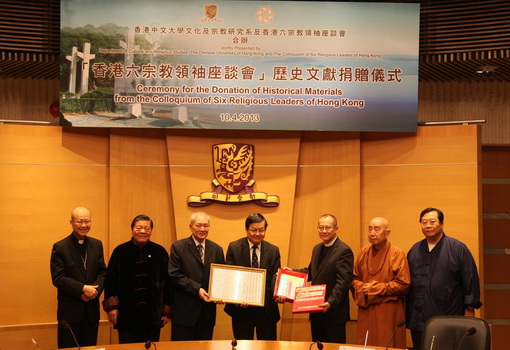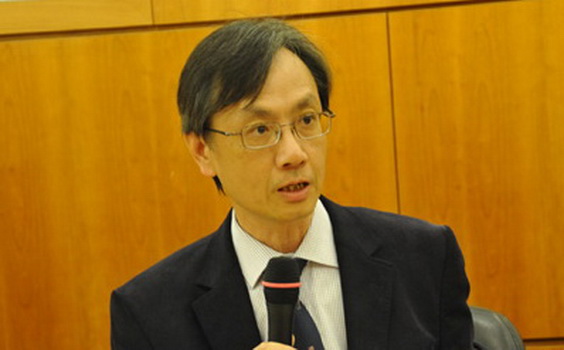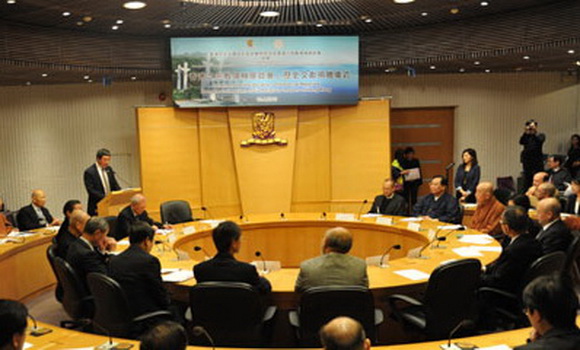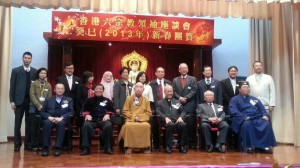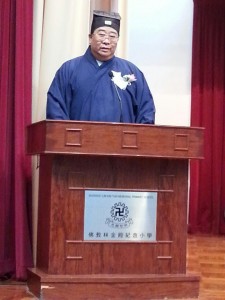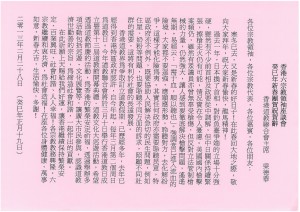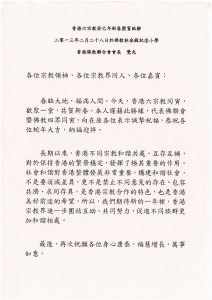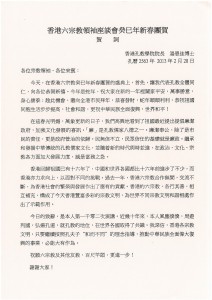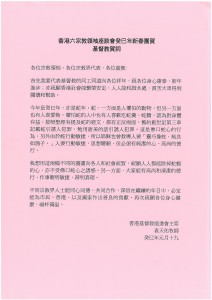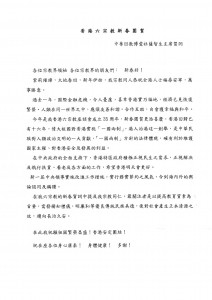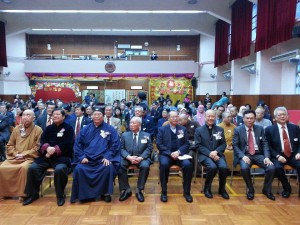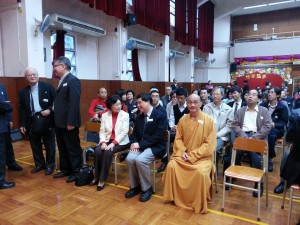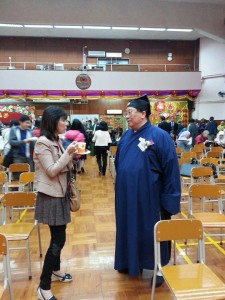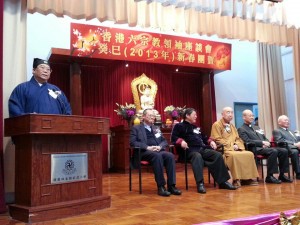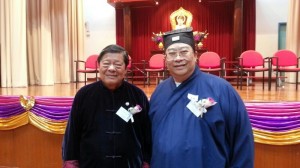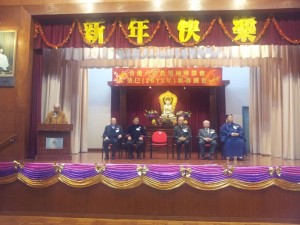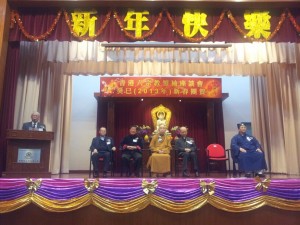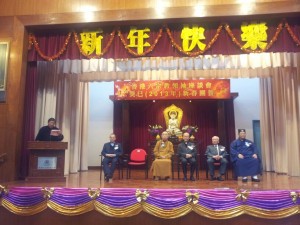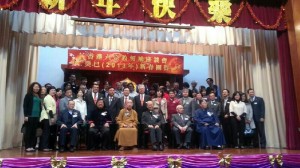‘道教消息’ 分類的彙整
-
任法融道長談:道德思想在現代社會的指導意義
任法融道長談:道德思想在現代社會的指導意義
視頻:http://v.youku.com/v_show/id_XNTc0MDE5MDI4.html
2013年5月,道教之音工作組有幸在甘肅通渭湛龍觀結緣中國道教協會會長任法融道長,任道長為各位網友開示道德思想在現代社會的指導意義。
結合這民俗文化,道文化是橫貫一切的,歷史源遠流長,道文化中心思想核心是道德的思想,道德的思想不但是一種文化的更替,也是人類社會發展的必然趨向。
道德文化思想就這麼厲害,19世紀中華民族出現個偉人孫中心先生就理解提倡讀《道德經》,有道才能有世界,有道才能有國家,道德思想文化就這麼深厚,在社會人類的意義特別大。
中華民族家喻戶曉都知道道文化,是從人類發展的歷史長河中,不管哪個時代攝朝理政,哪個空間的國度治理國家,都要突出道德思想。道德從廣義上講都要利益眾生,狹義上講凡是能有利於社會的發展進步,都是道德觀念。治理一個國家朝政,他不體恤老百姓,不善待民生,不關愛百姓,沒有道德觀念,誰搞誰倒楣,誰垮臺,從原始到現在還是到以後,道德的觀念都很重要。
這次在通渭縣,把道德文化思想研討放在前面是非常好的,咱國家在這幾年來,尤其是十八大,對生態文明的建設和文化的建設非常重視,對農村文化活躍國家非常重視。
一個沒有文化的人是愚蠢的人,文化的核心就是道德。比如政治話一下,共產黨自解放後60年代以來,代代領導都是親民愛民,關心老百姓,這都是道德思想的一種呈現。尤其是國家的大政方針都是改善民生,尤其是十八大,提出社會主義思想和全民建成小康社會的理念這是道德觀念。
所以宗教界應當與社會主義社會相適應,改善民生就是佛教講的普渡眾生,脫離苦海,這都是講人民過上好日子,習近平主席最近講中國夢,夢就是講未達到的願望,就是美滿幸福的生活,沒有實現的理想寬鬆愉快的環境,這就是夢想,中國人的幸福美滿寬鬆愉快就是小康社會,中國人的夢想就是這是夢想,這是願望。
習近平的中國夢這和道文化有關係,在西北甘肅地方,尤其是通渭這個地方,歷代因地理環境制約發展,這和道文化研究有關係,道文化再研究清楚,從宗教角度講可以調解著自然。
我記得在臨西安到蘭州搞過一個學術研討會,半年沒下雨,用冷化水招待,什麼原因啊?天人合一,國正天心順,國家太平,老百姓順從,天道就順,過去 中華民族常講國正天心順,官清民自安,妻賢夫禍少,子孝父心寬,這就是天人合一的文化。
前幾年地震多,大旱大澇,但是要國正,國正天心才順,在政治化一下,當前十八大提出的戰鬥目標就是關愛百姓、改善民生,天道會越來越順,希望本地方加強道文化研討,會議要呈現社會公德,職業道德,家庭美德,個人品德 這都是道文化的核心思想,這樣才能無形的對社會形成很文明的社會關係,社會祥和了對經濟,對社會都有好處。
-
晨曦文化教育協會
晨曦文化教育協會
晨曦文化教育協會為一所非牟利組織團體,其宗旨致力宏揚中華優秀文化傳統,傳承儒、釋、道普世價值思想理念,倡導德育教化,栽培未來棟樑學子,惠己及人。實行以美言,美行渲染青年少子,從而提升未來世代學養素質。
2011年首次參加第22屆香港書展,翌年再次參加第23屆香港書展,今年再次參加2013年第24屆香港書展。書展期間除免費派贈自行編印出版的孝悌忠信禮義廉恥和諧社會的書刊外,還有中國啟蒙教材 ( 弟子規 )等善書、善咭,修德立品處世學書藉,勸善戒忍貼張,VCD兒童卡通教材光碟等各類數以萬計的修己度人的書刊物品。
晨曦文化教育協會連續第三年參展, 參展攤位
心靈書區,3G – F25活動及詳細資訊可瀏覽以下網址:http://www.dawncea.com.hk/
-
THE Youth WAY 道教青年團團員招募
香港道教聯合會
道教青年團團員招募
THE Youth WAY
香港首個由青年主導發展的[ 道教青年團 ] ( 道青團 ) 現正招募
有興趣與其他年青人一起認識道家哲理,以培養品德人格,並發揮領導才能,組織和推動青年服務社會, 弘揚道教文化之12至40歲青年人,成為團員。
[ 道教青年團 ]之宗旨
1. 弘揚道教文化
2. 推動青年服務社會
3. 培育青年道教領袖
4. 促進本地與外地宗教青年團體之交流道青團之多元化活動
~ 恆常團聚交誼
~ 領袖發展培訓
~ 道教文化研修
~ 義工社會服務
~ 文化藝術活動
~ 外地交流考察道教是中國土生土長的宗教。「道」是道教的最高信仰,為教義思想和修行的核心。道教文化源遠流長,博大精深,對中國文化影響至深,舉凡天文、地理、哲學、醫學、科技、藝術、武術、習俗等,無不因其而發展。魯迅先生就曾說:「中華文化根柢全在道教」。
道教文化之傳承、創新與弘揚,需要您的參與!
報名及查詢:
香港道教聯合會
地址:九龍長沙灣青山道156號永基大廈8樓
電話:2396 4881 傳真:2391 2001 電郵:admin@hktaoist.org.hk
網址:www.hktaoist.org.hk -
香港道教聯合會宴請教育局局長吳克儉博士
2013年6月14日
香港道教聯合會辦校團體聯同會屬辦學宮觀團體、各校校董、校長等設午餐宴請教育局吳克儉局長、常務秘書長謝凌潔貞、葉曾翠卿副秘書長、陳嘉琪副秘書長(課程及質素保證科)、教育局局長政治助理施俊輝先生、總學校發展主任(大埔)陳輔民先生等長官,藉此了解教育政策和互相交流教育工作各項問題。席間,道教會送吳局長一本 道教文獻「利物濟世」介紹道教在香港過去數十年間所行的善業。香港道教聯合會主席梁德華編,冀望教育局更了解道教的事業,教育理想。
《利物濟世──香港道教慈善事業總覽》圖文集,由香港道教聯合會出版,乃是幾位資深的香港宗教研究學者負責資料搜集和編寫,圖文集之序更找來前政務司鍾逸傑爵士撰寫,全書200多頁,圖文並茂,資料珍貴,收錄了百多年來,香港各大小道堂在各個不同時期的社會公益活動。編輯小組在過去兩年間,採訪了七十多所不同道派的道堂,對其推行慈善事業的實況作了口述和數據的資料搜集,更從各種歷史研究及數十年來的報章報道中尋找種種相關的記述和實例,將香港的道教活動,歸納為弘揚傳統文化和社會服務兩大方面,包括:宗教信仰、贈醫施藥、辦學育才、安老濟困、賑災建設、社區服務等,並逐一作出介紹。
香港道教的慈善事業,起自道教傳入之始,百多年來與時並進,道堂中的先賢後哲,前赴後繼,不懈努力。戰時亂世餓殍遍野,天災疫病人心惶惶,道教界除了啟建法會、息災祈福外,更施粥賑濟、收容孤寡;戰後重光、百廢待舉,道堂施醫贈藥、寒冬送暖、倡辦義學……時至今日,道教的慈善事業的重點已由救貧賑濟發展成綜合多元的社會服務及持續的教育服務,與此同時,隨著道教的日漸興旺,亦推進了道教公益慈善服務向多元化、規模化、體系化、現代化和科學化發展。道教與香港社會的發展有著密切的關系,香港道堂長期濟世利人的社會公益服務,蔚成優良傳統,廣受社會民眾所認同。
-
香港道教界為四川雅安地震亡魂超度公祭
香港道教界為四川雅安地震亡魂超度公祭
啓建超度四川地震災難法會
香港道教聯合會主辦 會屬道堂協辦 官紳賢達 各界踴躍支持
由香港道教聯合會(下稱:道聯會)主辦,會屬道堂協辦之"全港道教界祈禱四川雅安巿地震災難平息、罹難者超度法會"於4月29日(星期一) 上午9時至下午6時在九龍塘律倫街7至8號省善真堂舉行。
公祭儀式於當日下午一時舉行,由中央政府駐港聯絡辦協調部張方副部長、民政事務局局長政治助理徐英偉先生、九龍城民政事務助理專員溫志揚先生、九龍城區議會副主席潘國華先生聯同道聯會主席梁德華道長及各道堂首長一同主祭,向道教三清殿內眾仙真獻香獻花,並由梁德華主席誦讀追悼文,祈求道教三清殿內眾仙真護佑,罹難者早登仙界,傷病者早日康復。會上,香港各道堂宮觀、學校師生代表及社區人仕一同參與,儀式莊嚴而隆重。
四川省雅安巿地震災情嚴峻,傷亡慘重,災民身心受創,經歷生離死別,生命和財產皆蒙受重大損失,哀鴻遍野,聞者無不哀傷。相信身處福地的香港人雖未經歷地震之災,但也會感同身受。道聯會謹此呼籲全港道教徒為受災人士祈福,故此,舉辦此法會,並得到會屬道堂支持,一同表達全港道教界對眾生及社會之關懷。
-
香港道教聯合會第廿四屆理事會訪京團 –拜訪中國道教協會
香港道教聯合會第廿四屆理事會訪京團2013年4月14至17日
香港道教聯合會第廿四屆理事會訪京團一行26人在梁德華主席的率領下來到中國道教協會拜訪。中國道教協會副會長張繼禹、黃信陽,秘書長王哲一等會見了客人。
張繼禹副會長在座談會上對香港道聯會新一屆理事會的選舉產生表示祝賀,對訪京團的來訪表示熱烈歡迎。他回顧了中國道協與香港道聯會交往的歷程,合作舉辦的「國際道德經論壇」等重要活動。他希望兩地道教界繼續密切聯繫和合作,共同弘揚道教文化,推動道教事業的整體發展。他表示,香港道教界多年來在服務社會、利益人群方面的經驗,值得內地道教界借鑒。梁德華主席介紹了香港道教聯合會第廿四屆理事會的情況,並談了該會明年舉辦「慶祝中華人民共和國成立65周年系列紀念活動」等設想,希望能和內地道教界繼續加大合作力度。
黃信陽副會長、王哲一秘書長也在座談會上致詞。座談會由王哲一秘書長主持。 -
香港道教聯合會第廿四屆理事會訪京團 – 拜訪國家宗教事務局
香港道教聯合會第廿四屆理事會訪京團
2013年4月14至17日
國家宗教局局長王作安會見香港道教聯合會第二十四屆理事會訪京團
2013年4月15日,宗教局局長王作安在局機關會見了由新任主席梁德華道長率領的香港道教聯合會第二十四屆理事會訪京團一行。
梁德華主席介紹了新一屆理事會2014年的工作規劃與安排,並熱誠邀請國家宗教局屆時派員參加相關活動。王作安對香港道教聯合會換屆伊始就組團訪京表示衷心感謝,對梁德華道長及新一屆理事會成員的當選表示熱烈祝賀。他說,在中央政府和香港特區政府的關懷下,特別是在香港道教界的長期不懈努力下,香港終於有了第一個「道教日」,這對香港道教社會地位的提升,對道教形象的改善都有很好的作用,內地與香港不分彼此,香港道教界有什麼需要我們支援和説明的,我們都會不遺餘力、大力支持。
梁德華主席向宗教局闡述香港道教聯合會未來發展計劃
「明道立德」是香港道教聯合會創會的宗旨,成立46年來,歷屆主席和理事會同寅都秉承這個理念,致力推廣道教信仰和教義,繼往開來,投入社會服務市民,教化信徒,達至修己度人,道濟群生的目標。
今2013年,廿四屆理事會,更積極集中興起中華文化教育工作,藉此德育教化市民大眾和信徒道侶,使他們更認識道家思想和道教教義應用於日常生活,處事待人,能做到兼融互重,上善若水的和諧和共存。
因此,針對現今社會的戾氣,香港道教聯合會計劃以下目標作為重點會務︰
1. 成立道教青年團(道青團)
召集青少年為團員,不論宗教和文化背景,讓團員獨立性組織社會服務和德育教化活動,目的是潛而黙化地把道德思想傳播,影響社會風氣。青少年是未來社會的棟樑,由他們自己發揮和互相影響至為珍貴。
2. 明年是祖國65周年,為了顯示愛國愛港的民族精神,表揚忠孝理念。香港教聯合會將聯合兩岸四地與東南亞地域舉行禱天祈福法會和道教文化論壇。藉著祈福信仰祈求祖國昌盛,國富民強,香港繁榮,社會和諧;文化論壇論題為「忠、孝的教育」,藉此倡導德育教化。
3. 繼香港特區政府認許每年三月第二週日命名為「道教日」兼響應政府的提出提昇道教社會地位,我們計劃藍圖,創做香港道教文化中心,預計內設文化展覽館、道教圖書館、綜合演講廳和會議廳,建造三清聖殿,定期舉行大型祭祠等……把計劃呈交香港特區政府,申請撥地和資助,讓土生土長的道教信仰豎立在香港。
我們期望通過上述各項工作,弘揚道教信仰,影響社會,使市民安居樂業、和諧相處,這就是香港道教聯合會的使命。
香港道教聯合會曾忠南副主席、黃漢翰副主席、葉文均副主席及吳連滋顧問、湯覺嫦道長等先後發言,表達了弘揚道教文化、培養道教人才、加強與內地道教交流的期望。王作安一一作了熱情回應。
-
「香港六宗教領袖座談會」歷史文獻捐贈儀式
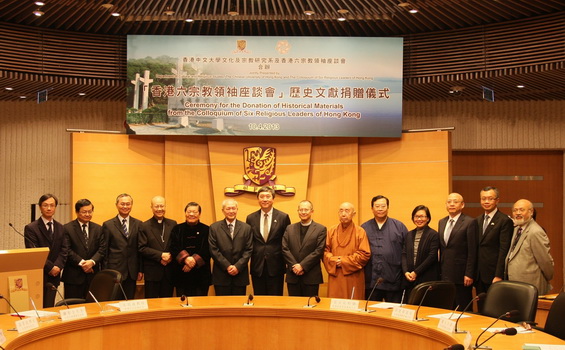
一眾嘉賓合照。(左起)中大文化及宗教研究系系主任黎志添教授、文學院院長梁元生教授、副長校霍泰輝教授、湯漢樞機、湯恩佳博士、薩智生先生、沈祖堯校長、袁天佑牧師、覺光法師、梁德華道長、民政事務局許曉暉副局長、中聯辦協調部張方副部長、中大教務長及秘書長吳樹培先生,以及中大神學院院長盧龍光教授。
香港中文大學獲捐贈文獻六大宗 - 學界共用研究
4月10日下午三點,香港中文大學(中大)與「香港六宗教領袖座談會」假香港中文大學行政樓地下祖堯堂舉行了歷史文獻捐贈及簽約儀式。
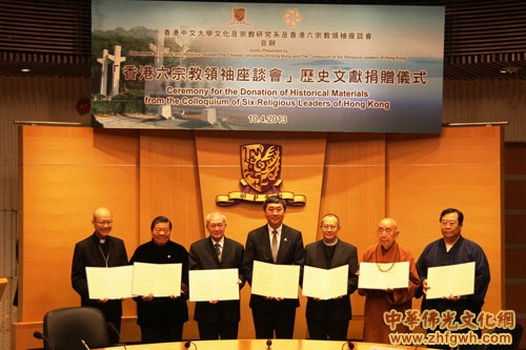
香港六宗教領袖:天主教香港教區主教湯漢樞機、孔教學院院長湯恩佳博士、中華回教博愛社主席薩智生先生(左一至左三)、香港基督教協進會主席袁天佑牧師、香港佛教聯合會會長覺光法師及香港道教聯合會主席梁德華道長(右三至右一),與中大校長沈祖堯教授共同簽署協議書,捐贈文獻予中大。
出席儀式的主禮嘉賓有香港道教聯合會主席梁德華道長、香港佛教聯合會會長覺光法師、天主教香港教區主教湯漢樞機、孔教學院院長湯恩佳博士、中華回教博愛社主席薩智生先生、香港基督教協進會主席袁天佑牧師、香港中文大學校長沈祖堯教授、香港中文大學副校長霍泰輝教授、香港中文大學文學院院長梁元生教授、香港中文大學文化及宗教研究系系主任黎志添教授。一百餘位來自各宗教的代表以及多家媒體出席捐贈儀式現場,一同見證了此歷史性的一刻。
「香港六宗教領袖座談會」由佛教、天主教、孔教、伊斯蘭教、基督教及道教於1978年共同成立,旨為溝通教際友誼,透過交談會及互相訪問,以不同宗教「和衷共濟、存異求同」為宗旨,樹立社會和諧典範。
是次「香港六宗教領袖座談會」捐贈予中大的文獻包括:自1978年以來「香港六宗教領袖座談會」的會議紀錄,與及早於1976年的宗教聯誼晚會場刊及邀請函件、對外公函、聯合新春文告、歷年舉辦之思想交談會場刊、成立紀念特刊等,合共118份重要文獻檔案,並有珍貴相片逾3,400多張。這批珍貴歷史文獻,不但充分反映六大宗教之間的團結與合作情誼,更紀錄及見證了六大宗教過往對香港社會作出的莫大貢獻。
歷史文獻捐贈及簽約儀式在莊嚴的氣氛下進行,沈祖堯校長與六位宗教領袖進行簡單而隆重之協議書交換儀式。六大宗教領袖並於儀式上將「香港六宗教領袖座談會」成立25周年之時間囊紀錄牌捐贈予中大,由文學院院長梁元生教授代表接受,以祝賀簽訂協議及雙方之間的合作。沈校長表示:「十年前,『香港六宗教領袖座談會』在香港公園立石埋下了時間囊;十年後,一份捐贈協議書使得香港中文大學有幸成為一個『開放』的時間囊。我們在被寄予厚望的同時,更感受到一份保存歷史記憶的責任感。我真切希望這份協議書更標誌著一個歷史性的開始,成為雙方長久合作的一個契機。」
而「香港六宗教領袖座談會」現屆輪值主席中華回教博愛社主席薩智生先生亦表示:「『香港六宗教領袖座談會』35年得來不易的成果,薪火世代相傳,今次承蒙香港中文大學文化及宗教研究系的大力支持,在中大文宗系設立『香港六宗教領袖座談會』歴史文獻資料庫,令我他們深感欣慰,期望在未來的日子裡,更多有關六宗教的文獻會寄存在這裡,令更多社會人士對我們有更深的認識及了解」。
捐贈品數碼化 學界共用研究資源
在文獻捐贈典禮前,中大文化及宗教研究系系主任黎志添教授及「香港六宗教領袖座談會」代表在中大行政樓舉行記者會,介紹有關的歷史文獻及其在學術研究上的價值。
本次「香港六宗教領袖座談會」向捐贈的歷史文獻將永久存放於香港中文大學(中大)文化及宗教研究系。這些文獻紀錄了香港六宗教在過去三十五年來的相互合作,對本土文化及宗教研究有重大意義。中大也會將這些資料轉化為數碼檔案提供網上平臺給予研究者,以供作宗教對話與交流活動的研究。當前宗教文獻數碼化在美國、臺灣、日本、香港等地都在進行中。通過國際合作將經典文獻數碼化後放入一個龐大的資源庫之中,文獻搜索的功能、文獻比較的功能(文獻不同版本之間的比較)將會得到更多應用,整個文獻數碼化的工程將會給宗教研究帶來新的契機。
中大文化及宗教研究系(文宗系)多年來以培養學生具備多元宗教知識、將各種宗教文化帶向不同群體、促進各個宗教之間交流為己任。早於2005至2006年,文宗系便成立了天主教研究中心、基督教研究中心、道教文化研究中心及人間佛教研究中心,致力從事與各宗教相關之研究計劃,並定期出版書刋、舉辦學術研討會、公開講座及文化活動等。文宗系將妥善保存和管理由「香港六宗教領袖座談會」捐贈之歷史文獻,並提供網上平台予研究者,協助他們就有關「香港六宗教領袖座談會」的歷史和活動進行研究。
香港六宗教對話:「和衷共濟,存異求同」
香港六大宗教包括:佛教、道教、孔教、基督教、天主教、伊斯蘭教,六大宗教互相尊重合作而產生的「香港六宗教領袖座談會」於一九七八年首次舉行,至今已有35年歷史。之後的每年六宗教輪流舉辦互訪活動互相觀摩和認識,每次由不同宗教領袖擔任主席。六大宗之間的交流和對話也促進了香港社會的融洽穩定,展現了「和衷共濟,存異求同」的精神。
「六宗教領袖座談會」已在香港中文大學文化及宗教研究系文宗系設立「香港六宗教領袖座談會」歷史文獻資料庫,這對教界和學界的合作互動是一個新的契機,為研究宗教對話與交流的學者提供了更為便捷的訊息和平臺。
-
香港六大宗教領袖座談會癸巳年新春團賀
香港六大宗教領袖座談會
癸巳年新春團賀
2013年2月28日
香港文匯報訊 – 春回大地、福滿人間。香港六大宗教領袖日前聚首一堂,祝願全港市民福壽安寧,萬事如意。六大宗教領袖致辭時均表示,香港的繁榮有賴社會各界和諧共處,互相包容,合作互助,這樣香港的明天將更美好。
香港六大宗教領袖座談會暨癸巳年新春團拜,日前在佛教林金殿紀念小學舉行,活動今年輪值由佛教承辦。佛教聯合會會長覺光長老、天主教香港教區湯漢樞機主教、孔教學院院長湯恩佳、中華回教協愛社主席薩智生、基督教協進會主席袁天佑牧師,香港道教聯合會主席梁德華等出席團拜。
覺光:社會和諧利港發展
覺光致辭表示,香港不同宗教長期以來和諧共處,對保持香港繁榮穩定發揮了極其重要的作用。他又強調社會和諧對香港整體發展非常重要,構建和諧社會,不是要消滅差異,更不是禁止不同意見的存在,而包容共濟、求同存異一直是香港宗教合作的特色,也是香港美好前途的希望,期待新一年香港宗教界進一步團結互助,共同努力,促進不同族群更和諧相處。
湯漢:遇難事宜放遠眼光
湯漢致辭說,身為信徒,在遇到困難時,都應該齊心協力,解決困難,令到大家都得到進步,並坦言凡事都有起伏,香港過去經歷了很多挑戰,但只要齊心一致,大家眼光放遠、放大,事情就可以解決,即使大家有不同意見,都應該持聆聽的態度,有則改之,無則嘉勉。
湯恩佳:各宗教和諧相處
湯恩佳表示,回歸16年來,香港力求向上,克服不同挑戰。過去一年,香港六宗教合作無間、交流不斷,為社會繁榮發展作出了應有貢獻,各行其善,相互補充,構成了今日香港豐富多彩的宗教文明,為世界不同宗教文明和諧相處,發揮了示範作用。
薩智生讚中央務實節約新風
薩智生指,過去一年國際金融危機令人憂慮,慶幸香港是一塊福地,經濟恢復繁榮。他認為人類處在同一世界中,應友善和諧、合作互助,自會獲得幸福與和平。我國新一屆中央領導層實施改進工作措施,厲行務實節約之風氣,廣獲海內外輿論認同及稱讚,而在中央全面支持下,特區政府積極正視民生需求,推行扶貧、養老等各方面工作,希望香港明天會更好。
梁德華冀港府聽民意重民生
梁德華致辭說,凡事都不應「逞強」,而要順應形勢,聆聽對方,化解紛爭,化險為夷,任何政府都需要聆聽民意,特區政府也不例外,既要協助人民解決急切的民生問題,也要聆聽不同方面的訴求,照顧不同社群的需要,此有利社會長遠發展。
癸巳年新春團賀相片及演講辭
其他宗教領袖演講辭 (尚未收到天主教演講辭)
癸巳年新春團賀相片
-
The relation between Taoist culture and it』s beliefs
Seminar atHuachiew Chalermprakiet University
Samut Prakan, ThailandBy Master Leung Tak WahIntroductionI would like to thank the Taoist Hwa Kwong Temple and the Taoist Hwa Kwong Athletic Association 6th Anniversary celebration organising committee and the Huachiew Chalermprakiet University for the opportunity to share at this seminar, but I have to admit I have mixed feelings.Thailand is a predominantly Buddhist country. As a Taoist disciple, I am happy and honoured to be able to share about my beliefs and Taoist culture in an important academic institution like the Huachiew Chalermprakiet University.I am practicing Taoism for over thirty years, and I am ordained as a thirty second generation disciple of the Quanzhen Dragon Gate tradition. I followed my father since young at the Fung Ying Seen Koon, and became the second generation disciple of the temple. I am currently serving as the Tutor of Rites for the Fung Ying Seen Koon. Taoist knowledge is so vast and deep, and I indeed feel nervous and stressed sharing in front of so many university students and academia. I would appreciate if you could highlight and share with me if you disagree with any of my sharing.Taoism is the only indigenous religion of the Chinese, and it encompassed the wisdom of the ethnic Chinese civillisation and its culture and traditions. This year is also the 4710th year of the Taoist calendar.It is really a challenge to share about the Taoist beliefs and culture in an hour, therefore, I will be giving you a brief introduction to two topics. First, I shall share with you the relationship between the Tao (道), Taoist school of thought (道家), and the Taoist religion (道教). Finally, I will also share with you the significance and values depicted in Taoist rituals.(1) Tao, Taoist culture, and Taoist religionThe character 「Tao」 (道) existed since ancient times, and it signifies the source of the Universe, and the evolution of all creations. This is the origin and source of the Taoist school of thought and the Taoist religion. There are six main schools of thought in ancient China as mentioned in the Records of the Grand Historian (史記) by Sima Qian. Taoism (道家) is one of the six schools, including Confucianism (儒家), Legalism (法家), Mohism (墨家), Logicians (名家), and the School of Yin and Yang (陰陽家). The Five Pecks of Rice tradition (五斗米道) was the first Taoist religious movement established by Zhang Daoling in the late years of the Eastern Han Dynasty, the movement comprised of twenty four dioceses.The Taoist school of thought and the Taoist religion complement one another and they are correlated. The Taoist school of thought is often regarded literally as 「philosophical Taoism」, and the Taoist religion is regarded as 「Religious Taoism」. The rituals and scriptures practiced in religious Taoism expressed many Taoist ideas and teachings, and these originated from the wisdom of the philosophers of the Taoist school of thought.I would like to cite the following example:The highest deities of the Taoist religion is the Three Pristine Ones, also known as 「San Qing Dao-zu」 (三清道祖).Presiding in the centre of the 「San Qing」 is the Primeval Lord of Heaven, or 「Yuan-shi Tian-zun」 (元始天尊), who held a round pearl in his hands, signifying the 「Qi」 (炁), or the Original vital breath of the Dao, which is the fundamental energy which existed even before the creation of Heavens and Earth. That is the known as the state of 「Wu-ji」 (無極).To the left of the 「Yuan-shi Tian-zun」 is 「Ling-bao Tian-zun」 (靈寶天尊), also known as the Heavely Lord of the Numinous Treasure. He held the Yin-yang mirror, which signifies the birth of the state of 「Tai-ji」 (太極) from 「Wu-ji」. On the right of 「Yuan-shi Tian-zun」 is 「Dao-de Tian-zun」 (道德天尊), or the Heavenly Lord of Dao and its Virtue, also known as 「Tai-shang Lao-jun」 (太上老君). He holds a fan, symbolizing 「liang-yi」 (兩儀), or the two energies which symbolized Heavens and Earth.The image of the Three Pristine Ones, or 「San Qin Dao-zu」, reflects the Taoist belief of 「From one vital breath forms San Qing, the state of 『Wu-ji』 evolved into 「Tai-ji」, and from 「Tai-ji」 it developed into 「liang-yi」, and from 「liang-yi」 froms all creations and things in the Universe. (一炁化三清,無極生太極,太極生兩儀,兩儀生萬物。) This also reflects the Taoist idea that 「Dao」 (道) embodies the Three Realms (三界) of Heavens (天), Earth (地), and Man (人), and 「Dao」 is the source and origin of all creations and objects.The Scripture of Peace and Tranquility (清靜經), Tai-shang Lao-jun (太上老君) expressed that 「The Great Dao has no form, yet it forms Heaven and Earth; The Great Dao is unbiased, it governs the changes in the universe and the patterns of the sun and the moon; The Great Dao seeks no acknowledgment, yet it nurtures and provide for all creations; I don』t know the name of this numinous energy, but I named it 「Dao」 to make reference to it.」 (大道無形,生育天地;大道無情,運行日月;大道無名,長養萬物;吾不知其名,強名約『道』。)The Taoist school of thought 「Dao-ji」, or philosophical Taoism, regards the 「Dao-de Jing」 (道德經) by Lao-zi (老子), 「Nan-hua Jing」 (南華經) by Zhuang-zi (莊子), 「Yin-fu Jing」 by the Yellow Emperor (黃帝), and other philosophical classics as the sacred texts. These scriptures are fundamental for Taoists to cultivate themselves to assist others (修己度人). Taoists believe that 「Tai-shang Lao-jun」 came to the mortal world as 「Lao-zi」, Zhuang-zi is styled 「Perfect Man Nan-hua」 (南華真人), and the Yellow Emperor is regarded as the ancestor of the Chinese people, and the ancestral patriarch of philosophical Taoism.Taoist religious beliefs of the immortals correlates to the philosophical teachings of Lao-zi. The Dao-de Jing mentions 「The creation of Heaven and Earth evolves to all other creations in the Universe, and this is the greatness of Dao」 (有物混成,先天地生,…強為之名曰大。). It also mentions that 「Dao creates One, One creates Two, Two creates Three, and Three generates all creations and things in the Universe」 (道生一,一生二,二生三,三生萬物。) Both verses explained that 「Dao」 is the state of 「Wu-ji」, One is the 「Tai-ji」, and Two is 「liang-yi」 (道是無極,一是太極,二是兩儀。), and it is a testament that Taoist philosophy and Taoist religion are both inter-related and both complementing each other.Both Philosophical and Religious Taoism believe that 「Dao」 is the fundamental belief. Taoists believe in the existence of the Three Realms – Heaven, Earth, and Man (天、地、人); and it includes the belief of the immortals and deities in the Heavenly Realm (天界), Spirits in the Earthly Realm (地界), and Man on the Mortal Realm (人界).How do Taoists view life and death? Taoists believe that birth and death is inevitable in all life forms (有生必有死). The exhibition of birth and death, fortune or misfortune, depends on the good actions and wrong doings of the individual. Taoists believe that one who is kind and compassionate will be blessed with longevity and good health, and those with evil intentions and harm others will be plagued with misfortune (善人得賜福長壽;惡人獲降禍厄困).Taoists believe in the heavenly deities and also the spirits. One who accumulates merits and does good will be able to attain the Dao, ascend the heavenly realms and free from all sufferings. Those who commit bad actions will be condemned to the netherworld and not be able to liberate from sufferings.(2) Taoist Rituals and Taoist PhilosophyTaoist RitualsTaoist Rituals are known as 「ke-yi」 (科儀), where 「ke」 (科) refers to the sacred scriptures, and 「yi」 (儀) refers to the ceremonies and etiquette of the liturgies. There are two main categoties for Taoist rituals, one for blessing the living (祈福), and another for the salvation of the dead from sufferings (度亡). The Taoist deities are also classified into Earlier Heaven Deities (先天神) and Latter Heaven Deities (後天神). Earlier Heavens Deities are formed by the vital breath of Dao, which includes the Three Pristine Ones (三清道祖), the Jade Emperor (昊天玉皇), the Five Venerable Sovereigns (五方五老), the Heavenly Lord of Supreme Oneness and Salvation from Misery (太乙救苦天尊), etcetera. The Latter Heaven Deities were once mortals who practiced and cultivated to attain immortality, people who contributed greatly towards mankind or the country, and were conferred as deities by the Emperors or by the common people. Latter Heaven Deities include Celestial Master Zhang Daoling (張道陵天師), Patriarch Lu Dongbin (呂祖師), the Goddess of Mercy 「Guan-yin」 (觀音大士), Lord Guan (關帝), etcetera.Taoists believe in the existence of the Three Realms, naturally, they will seek the blessings from the heavenly deities to bestow blessings, ward off misfortune, pray for longevity and good health. The Li-dou ritual (禮斗科儀) is one such example to pray for good luck and fortune. Salvation rituals for the dead (度亡科儀) will be conducted to seek the heavenly deities pardon their sins, advocate the proper teachings and counsel the spirits to do good and forgo evil, and also allow the spirits to repent and seek forgiveness for the wrongdoings they had committed, so they may be delivered from the sufferings.Regardless of blessing or salvation rituals, they encompassed different sets of etiquette and protocols,and different type of setups for the altars. For example in blessing rituals, the altar will be decorated in red colour, including the ceremonial robes of the priests which will also be red in colour. As for rituals for the dead, plain colour such as white or yellow will be used in the set up of the ritual altar and the priests will also be dressed in robes which are white or yellow in colours. Most importantly, all the scriptures and text used in the rituals include praising of the deities and immortals, reminders to do good and stay away from evil, repent and turn over a new leaf, and to express gratitude and repay kindness. It guides all to do good and serve others.Taoist PhilosophyTaoist scriptures such as the 「Dao-de Jing」 (道德經) and 「Yin-fu Jing」 (陰符經) expressed the ideas of the regulations and laws of nature and the universe (自然定律), relationship and interactions between the five elements (五行變化為哲理), and taught man to learn from history. Teachings such as 「wu-wei」 (無為) and not striving with others, using gentleness to overcome aggressiveness (以柔克剛), embracement and living together harmoniously (包容共存), the opposing relations between the five elements (五行生剋), changes and interactions between the Yin and the Yang (陰陽變化), and other ideologies to advise and inspire the practitioner. It allows mankind to understand and make sense of life and interactions in nature, cultivate oneself, unite the family, and also to govern the country. These ideas influence the beliefs of religious Taoism.SummaryI attempted to introduce the fundamental Taoist beliefs and the relationship between Philosophical Taoism and Religious Taoism in a simple manner, and hope you will pardon me for simplifying any ideas or teachings. I hope that we can have more oppurtunities to share our ideas and research into Taoist culture to achieve a harmonious society, and also world peace.Thank you.
